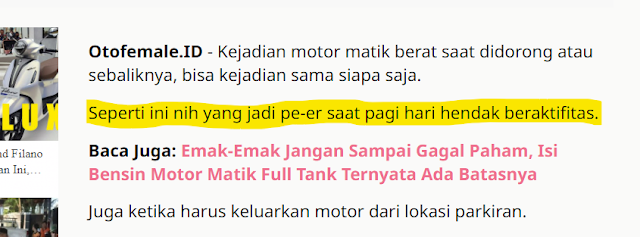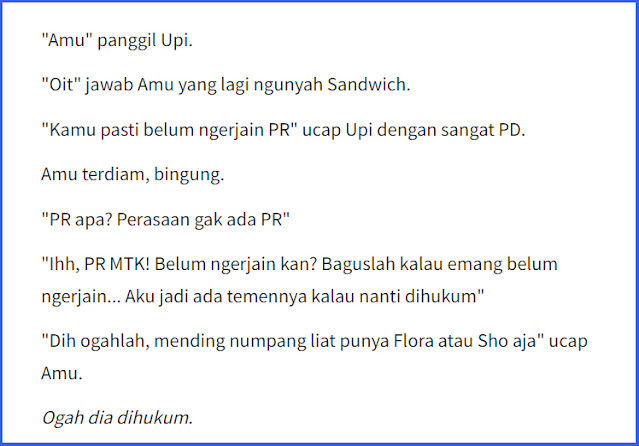- Get link
- X
- Other Apps
Posted by
Iman Prabawa
on
- Get link
- X
- Other Apps
Halo semuanya, ketemu lagi sama saya, Iman Prabawa. In this article, I want to talk to you about the meaning of PR in Indonesian. As always, we are going to be watching examples from YouTube videos, movies, comics, and whatnot where Indonesians use the word.
If you have any questions regarding the Indonesian language, you can ask me directly. You can see how to do that on my About Me page.
If you are a beginner in the Indonesian language, you can learn step by step with My Lesson Here.
So, let's dive right in.
PR, Pe Er, or Pe-Er In Indonesian
PR stands for Pekerjaan Rumah, and literally, it means homework. Sometimes you will see it is written as [peer] or [pe er] or [pe-er]. All are the same.
The first meaning of PR is homework, like homework from school.
Example sentence:
1. Kamu udah ngerjain PR belum? (Have you done your homework?)
The second meaning of PR is something that still needs to be done or something that you still need to learn, fix, or improve.
Example sentence:
1. Hal ini masih menjadi PR buat saya untuk bisa menjadi orang yang lebih baik. (This is something that I still need to work on to become a better person.)
2. PR UI masih banyak. (There are still a lot of things to be done in UI.)
Let's look at the picture above. In the picture, we see from the sentence here, "Namun, dibalik bangganya menjadi mahasiswa UI, tampaknya ada banyak hal di dalam Universitas Indonesia yang harus kita benahi. (However, behind the pride of being a UI student, there are still many things within the University of Indonesia that we must fix.)" This sentence explains that many things still need to be fixed. UI stands for the University of Indonesia.
3. Pe er banget sih ini buat saya juga. Anak-anak digedein bareng di satu rumah aja beda beda banget hasilnya ya, dan itu tanda memang ngga boleh berhenti belajar jadi orang tua. (This is, for me also something that I still need to learn. Even though the children are raised together in the same house, the results are very different, and that's a sign that you can not stop learning as parents.)
The third meaning of PR is something that is bothersome.
Example sentence:
1. PR banget motor matik terasa berat saat didorong. Mari kenali penyebabnya! (It's really troublesome when an automatic motorbike feels heavy when pushed. Let's find out the cause!)
2. Kejadian motor matik berat saat didorong atau sebaliknya, bisa kejadian sama siapa saja. Seperti ini nih yang jadi pe-er saat pagi hari hendak beraktifitas. (An automatic motorbike that is heavy when pushed can happen to anyone. This is a troublesome thing when you want to do activities in the morning.)
How to Pronounce PR
Here is how you pronounce PR in bahasa Indonesia.
Moving on, let's look at examples where Indonesians use the word PR.
Examples of PR In Use
The first example we are about to watch is taken from Bobo Cantik's YouTube Channel. Let's watch the clip below.
Below is what she says in the clip above with English translations.
Bobo Cantik: Dan mungkin sedikit masukan buat Alinson. Harus ada yang jaga stafnya di sini. Jadi, kalo misalnya kita mo lewat, ngga papasan sama orang, karena kalo papasan di spot ini agak PR banget ya. (And maybe a little input for Alinson. Someone has to be stand by here, maybe their staff. So, if we want to pass through this area, we don't meet other vehicles from opposite directions because if we meet other vehicles in this spot, it is very troublesome.)
The meaning of PR in this clip refers to the third meaning that I explained above, which is something that is troublesome.
Vocabulary From the Clip
[Dan] = and.
[Mungkin] = maybe.
[Sedikit] = a little.
[Masukan] = input.
[Buat] = [untuk] = for.
[Jaga] = stand by, guard.
[Kalo] is informal for [kalau] = if.
[Mo] is informal for [mau] = want.
[Lewat] = pass.
[Ngga] = [tidak] = no.
[Papasan] = meet someone or something by accident from the opposite direction. For example, you are driving a car, and then you meet other vehicles from the opposite direction. This is called [papasan].
[Banget] = very. For more about this, you can read my article here, Banget In Indonesian.
The second example is taken from Tekotok's YouTube Channel. Let's watch the clip below.
Below is the conversation from the short clip above with English translations.
Pak Guru: Ayo, anak-anak. PR IPAnya dikumpulkan ke meja guru. Ayo, ayo, ayo. (Come one, kids. Put the science homework on the teacher's desk. Come on, come on, come on.)
Bejo: Pak, nyerah, Pak, nyerah, Pak. (Sir, I surrender, sir. I surrender, sir.)
Pak Guru: Napa lu? (What’s wrong?)
Bejo: Nyerah, Pak. Saya serahkan diri, Pak. Saya ngga ngerjain PR. Damai, Pak, damai. Ini lambang perdamaian, Pak. (I surrender, sir. I surrender myself, sir. I didn't do my homework. Peace, sir, peace. This is a symbol of peace, sir.)
Pak Guru: Ya ampun, Bejo! Kamu lagi! Kamu lagi! Bentar. (Oh my God, Bejo! It's you again! And again! Just wait here.)
PR in this clip refers to the first meaning that I explained above, which is homework.
Vocabulary From the Clip
[Ayo] in this context is a word that you use to tell someone to hurry.
[Anak-anak] = kids.
[IPA] stands for Ilmu Pengetahuan Alam = science.
[Pak Guru] = male teacher.
[Nyerah] is short for [menyerah] = surrender.
[Pak] is an honorific title you use to address a man. That person is usually already married. For more about this, you can read my article here, Pak In Indonesian.
[Napa] is short for [kenapa]. [Kenapa] in this context is used to ask what is wrong with something. In this clip, it is written as [nape], and it has the same meaning. [Nape] is usually said by people from Jakarta.
[Lu] is informal for [Anda] = you. For more about this, you can read my article here, Lu In Indonesian.
[Ngerjain] is the colloquial way of saying [mengerjakan] = to do something. [Saya ngga ngerjain PR] = [saya tidak mengerjakan PR] = I didn't do my homework.
[Lambang] = symbol.
[Damai] = peace, silent.
[Perdamean] = [perdamaian] = peace.
[Ya ampun] are words that are used when you are angry or surprised.
[Kamu] = you.
[Lagi] = again.
[Bentar] is a common reduction for [sebentar]. In this context, this word is used to tell someone to wait for a little while.
The third example is taken from a story in Wattpadd. Let's look at the picture below.
Below are with English translations.
"Amu" panggil Upi. ("Amu" called Upi.)
"Oit" jawab Amu yang lagi ngunyah Sandwich. ("Oit," replied Amu, who was munching on a sandwich.)
"Kamu pasti belum ngerjain PR" ucap Upi dengan sangat PD. ("I bet you haven't done your homework," said Upi very confidently.)
Amu terdiam, bingung. (Amu was silent, confused.)
"PR apa? Perasaan gak ada PR" ("What homework? I didn't know there was any homework.")
"lhh, PR MTK! Belum ngerjain kan? Baguslah kalau emang belum ngerjain... Aku jadi ada temennya kalau nanti dihukum" ("Hey, Math homework! You haven't done it, right? If you haven't done it, it's really nice to know. So, I have a friend when the teacher punishes me.")
"Dih ogahlah, mending numpang liat punya Flora atau Sho aja" ucap Amu. ("Yeah, you wish! I would just better copy Flora or Sho's homework," said Amu.)
Ogah dia dihukum. (She doesn't want to be punished by the teacher.)
PR in this example refers to the first meaning that I explained above, which is homework.
Vocabulary From the Picture
[Ngunyah] is a common reduction for [mengunyah] = munching.
[PD] stands for Percaya Diri = confident. For more about this, you can read my article here, PD In Indonesian.
[Gak] = [tidak] = no.
[MTK] stands for MaTematiKa = math.
[Kan] is used when you are sure about something. For more about this, you can read my article here, Kan In Indonesian.
[Emang] is a common reduction for [memang] = indeed.
[Dih] is used to express feelings of disgust.
[Ogah] is used when you don't want to do something. For more about this, you can read my article here, Ogah In Indonesian.
Read also: Cenat-Cenut In Indonesian
This wraps up today's article. If I find another example, Insha Allah, I will update this article again. Thank you for reading this article, and I'll see you soon. Bye now.
- Get link
- X
- Other Apps
Hello, I'm Iman Prabawa a.k.a Pak Guru Iman. I love to share about languages. My Instagram, @pakguruiman





Comments
Post a Comment